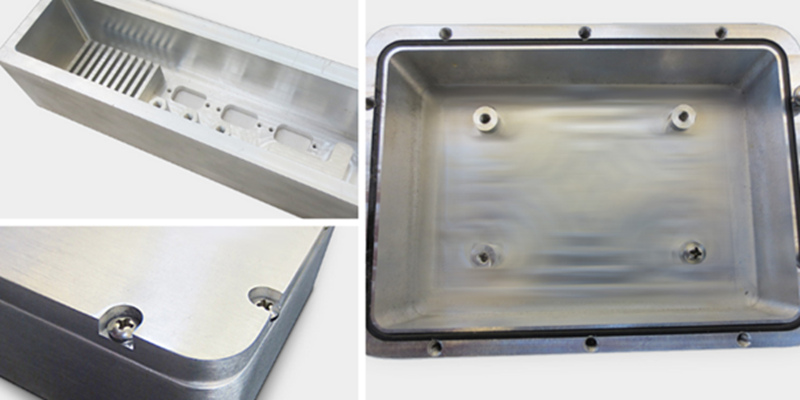Posted on: Dec. 15th, 2020, | By WayKen Rapid Manufacturing
Using CNC Aluminum enclosures eliminates the restrictions and constraints from using standard “ready-made” aluminum enclosures. Custom machining enclosures open great opportunities for customizing the shape, size, holes, slots, fixation points, and appearance. In short, they can be tailored specifically to match exact application requirements. These enclosures provide endless design possibilities without sacrificing the durability of the device as a whole.
WayKen is a leading provider of CNC aluminum services at the best pricing range. Let our experts handle your CNC aluminum projects.
CNC Machined Aluminum Enclosure Products
Aluminum enclosures provide impeccable protection because of their stable and durable nature as a material. They have excellent mechanical properties like corrosion resistance and great machinability. Moreover, they are lightweight and can be further processed for hardening and coating. These features make them perfect for many applications in the industry; below are the most typical applications of CNC aluminum enclosures:
Medical Devices
Medical devices have a high set of standards when it comes to device reliability, and one of the requirements is to have high-end and sophisticated housing for this equipment. The enclosures used for medical equipment are typically made with machined aluminum blocks. This is because aluminum alloys have very excellent corrosion resistance and high strength to weight ratio. The most common aluminum alloys used for these enclosures are 6061, 6063, and 3003.
Custom machined aluminum enclosures play an essential role in keeping medical equipment protected from any harm brought by external factors, which is why they are required to be tough and resilient. They are commonly seen as housings for ventilators, imaging equipment, heart monitors, and other delicate instruments. Aside from housings, they come in the form of carrying cases for handheld medical devices.
Consumer Electronics
Many electronic companies choose to use machined aluminum enclosures because they can be easily designed and customized to match the aesthetics of consumer electronics while maintaining reliable protection and fail-proof housing.
There is a wide range of aluminum enclosure applications in the domain of consumer electronics. CNC aluminum enclosures may come in the form of cell phone housings, tablet bodies, laptop enclosures. Other uses can be seen on different handheld devices like small remote controls, power bank cases, and many more.
Industrial Equipment Housing
The degree of protection for industrial equipment is very demanding. Enclosures should work perfectly even when exposed to unconventional environments with high-heat, harsh, corrosive, and high-wear conditions, which is where aluminum enclosures come in. Machined aluminum has the highest quality of durability, toughness, and rigidity when compared to other types of enclosures, making it the perfect choice for industrial setups. Additionally, they are perfect for precision applications wherein dimensional tolerances are required to be critically followed.
Some examples of machined aluminum enclosures are telecommunication cases, protected control boxes, lift stations, control panels on risky environments, wastewater treatment applications, solar battery storage, and many more. Furthermore, aluminum enclosures are used for sensitive electrical assemblies because of their natural RFI/EMI shielding properties.
Machining and Fabrication Process
Typically, the preparation for every machined aluminum enclosure involves designing on CAD software, creating a CNC program, and selecting the perfect aluminum alloy to be machined. They can be customized to any extent as long as the design is still machinable. After having the design ready, the next thing to prepare for is the CNC program. Moving further is the selection of materials, and typically they are made from raw aluminum blocks. The choice for what aluminum alloy to be used will depend on the desired extent of corrosion resistance, machinability, and on what secondary process it will undergo.
After the preparation phase, is the machining proper, and the most reasonable process for machining aluminum enclosures is through CNC milling. During the milling process, different end mills are responsible for cutting through the profile, slots, and pockets from the block of aluminum. Moreover, drills and taps are responsible for creating clearance holes and threaded holes. After the machining proper, depending on the fabricator, these can undergo a manual or automatic deburring process, wherein the part will be smoothened and cleaned out from protruding metal chips.
Finally, after having the part machined and smoothened out, material, secondary finishing processes are necessary to protect further or harden the enclosure. Choosing the application and the desired appearance will greatly influence the finish. Described below are three common types of aluminum finishes: painting, powder coating, and anodizing.
- Painting involves the use of liquid paint to coat the surface of the enclosure. These are available in many types of paints like acrylics, polyesters, fluoropolymers, and siliconized polyesters. There are unlimited choices of colors for this application that will suit the desired aesthetics.
- Powder Coating is similar to painting but with the use of “powdered paint.” This kind of paint is composed of a pigment encapsulated in a powdered resin, which makes it solvent-free. Powder coat finishes usually offer higher durability than liquid coats.
- Anodizing is an electrochemical process that involves immersing the aluminum part in a tank that contains an acid-based electrolyte. This process will result in the formation of a protective coating of aluminum oxide on the surface, which allows aluminum parts to maintain their metallic gloss while adding on a vibrant color. This process improves the aluminum enclosures’ durability, toughness, weather resistance, and corrosive resistance.
Advantages of Machined Aluminum Enclosures
- Customizability- The main advantage of CNC aluminum enclosures is their freedom of customization, wherein they could be designed to whatever profile, shape, or size.
- Precision and accuracy- Machined aluminum enclosures boast its feature of being able to be used for applications with tight tolerances like aerospace and medical applications.
- Durable and Reliable- A good thing about machined aluminum enclosures is that they do not swell nor bend. These aluminum enclosures have a high overall ruggedness rating due to their high tensile strength, making them rigid enough to withstand high impacts.
- Excellent Corrosion Resistance- The secondary processes for aluminum enclosures add up a great deal of corrosion resistance to the material itself. They are protected from harsh factors involving chemical irritants and other corrosive materials.
- Natural RFI Shield- The reason why aluminum enclosures are mainly used in electronics is that aluminum naturally blocks the passage of radio waves, making it able to protect the most sensitive devices.





